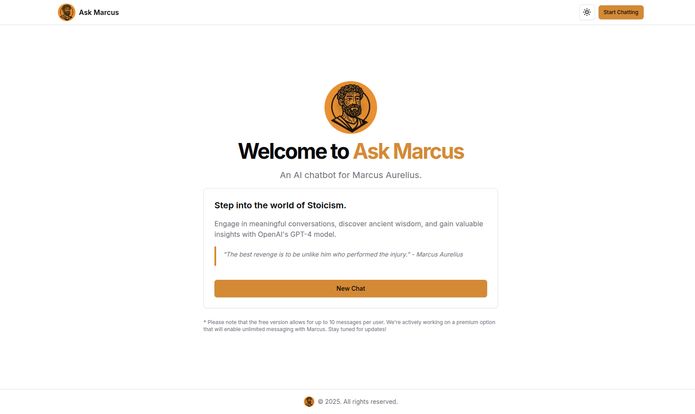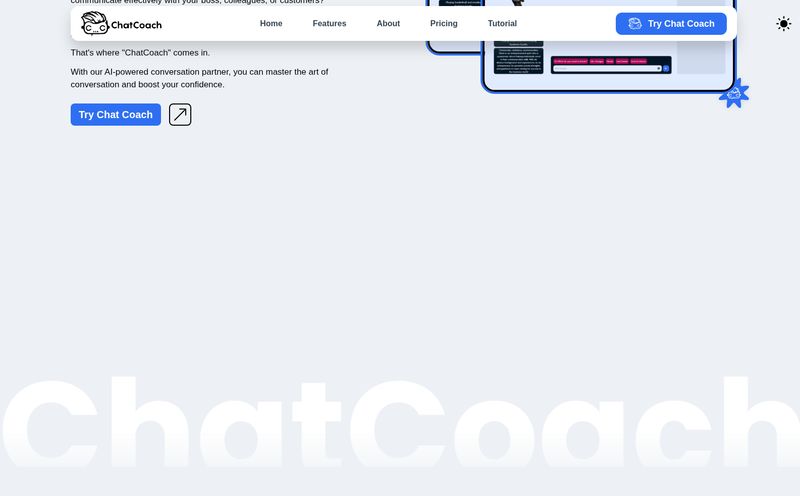Most days, life feels like a frantic scramble to keep all the plates spinning. Between endless email pings, the 24/7 news cycle screaming for our attention, and just the general pressure to do more, it’s easy to feel overwhelmed. I’ve spent years in the high-stakes world of SEO and traffic generation, and I can tell you, burnout is not a myth. It’s a feature of the modern workplace.
It’s probably why so many of us are turning back the clock, looking for answers in ancient wisdom. Specifically, Stoicism has had a massive resurgence. (Yes, that Ryan Holiday guy has built an empire on it, and for good reason.) The idea of finding inner peace and resilience, regardless of what the world throws at you, is pretty appealing, right? But reading dense philosophical texts like Marcus Aurelius's Meditations can feel... daunting. It's not exactly light beach reading.
So, when I stumbled upon a tool called Ask Marcus, my curiosity was piqued. An AI chatbot that lets you have a conversation with a digital version of the Roman Emperor himself? It sounds like something out of a sci-fi novel. Gimmick, or genuine tool for self-improvement? I had to find out.
What Exactly is Ask Marcus?
At its core, Ask Marcus is refreshingly simple. It’s a web-based AI chatbot designed to simulate a conversation with Marcus Aurelius. You ask a question about life, hardship, virtue, or whatever’s on your mind, and the AI responds from a Stoic perspective, drawing on the principles and writings of the great philosopher-king.
There's no app to download, no complicated sign-up process. You just land on the page and start chatting. I’ve always felt that the best tools are the ones that remove friction, and this one nails it. In an age where every service wants your email, your mother's maiden name, and your firstborn child, just being able to use something instantly is a breath of fresh air.
The platform makes it clear that it’s powered by OpenAI's GPT-4 model, which for us tech folks, is a pretty big deal. It signals that the responses should be more nuanced and contextually aware than your average chatbot.

Visit Ask Marcus - Conversations with Marcus Aurelius
My First Conversation with a Roman Emperor
So, I jumped in. My first question was a bit of a softball:
I'm feeling stressed about work deadlines. What should I do?
The response came back almost instantly. It didn't just give me generic 'manage your time better' advice. Instead, it framed the issue through a Stoic lens, talking about focusing on what's within my control (my effort, my attitude) and accepting what is not (the deadline itself, the expectations of others). It even quoted a relevant passage about focusing on the task at hand with “precise and genuine seriousness.”
Okay, impressive. It wasn't just spitting out pre-written text; it seemed to understand the sentiment behind my question. It felt less like a search engine and more like a wise, if slightly formal, mentor. It’s like having a philosophical pocket-knife; a sharp little tool you can pull out for a quick dose of perspective when you need to cut through the noise of your own anxieties.
The Good, The Bad, and The Philosophical
After playing around with it for a while, a clear picture started to form. Let's talk about what really works. The biggest pro, for my money, is the accessibility. It breaks down complex Stoic ideas into bite-sized, conversational chunks. You don't need a degree in Classics to get something valuable out of a five-minute chat. It’s a fantastic gateway for anyone curious about Stoicism but intimidated by the source material.
The use of GPT-4 is also a clear advantage. The conversations have a natural flow, and the AI does a good job of maintaining the persona of Marcus Aurelius without it feeling too campy or forced. The clean interface and lack of a login requirement are just icing on the cake. It's quick, its smart, and it respects your privacy.
However, it’s not without its limitations. The biggest one, as stated on their site, is that the free version caps you at 10 messages. Just as you’re getting into a deep philosophical groove, you hit a wall. They mention they're working on a premium option for unlimited messaging, but as of now, it's not available. This makes it more of a 'quick dip' than a deep dive. It's a taster, not the full meal. Which is fair, developing and running these AI models isn't cheap.
Why Stoicism is Making a Comeback (And Why This Tool Matters)
The modern world, for all its technological wonders, has left a lot of us feeling adrift. Stoicism offers an anchor. It’s a practical philosophy built for people in the trenches—soldiers, statesmen, and, yes, even Roman emperors. It’s not about suppressing emotion, but about understanding it and not letting it control you. It teaches resilience, virtue, and a kind of self-respect that comes from living in accordance with your values.
A tool like Ask Marcus is important because it bridges the 2,000-year gap between Marcus Aurelius writing in his tent during a military campaign and us tapping away on our phones in a coffee shop. It makes his wisdom feel immediate and relevant. Some purists might argue that you can't learn philosophy from a chatbot, and they're partially right. This AI isn't a replacement for reading Meditations or engaging in deep self-reflection. But that’s not its goal. Its goal is to open the door, to spark a thought, to offer a different perspective right when you need it most. And at that, it succeeds brilliantly.
The Tech Behind the Toga: Powered by GPT-4
I want to linger on the technology for a moment because it's what separates this from a simple quote generator. GPT-4 is one of the most advanced language models out there. This means the AI can grasp nuance, understand subtext, and generate responses that are not just grammatically correct but also contextually and philosophically coherent. It's the difference between an AI that says, "Stress is bad," and one that says, "The impediment to action advances action. What stands in the way becomes the way." One is an observation; the other is a reframe. That's the power of a sophisticated model like GPT-4, and it's used to great effect here.
Pricing: How Much for Ancient Wisdom?
This is the easy part. Right now, Ask Marcus is free to try. As mentioned, you get up to 10 messages per user. There is no pricing page and no premium plan to upgrade to just yet. The creators have noted on the homepage that a premium option for unlimited messaging is in the works. For now, you can get a solid feel for the tool without spending a dime.
Who is This AI Chatbot Really For?
So, who should give this a whirl? In my opinion, it’s perfect for a few types of people:
- The Stoic-Curious: If you've heard the term 'Stoicism' thrown around but don't know where to start, this is your perfect, no-pressure introduction.
- The Stressed-Out Professional: Need a quick reality check before a big meeting or after a frustrating day? A two-minute chat with 'Marcus' can be surprisingly grounding.
- Students of Philosophy: It can be a fun way to test your understanding of Stoic concepts and see them applied to modern problems.
- Anyone Seeking Perspective: You don't have to be a philosopher to benefit from a little wisdom. If you're just looking for a healthier way to think about your daily struggles, this is a tool worth exploring.
Frequently Asked Questions about Ask Marcus
- What is Ask Marcus?
- Ask Marcus is an AI-powered chatbot that allows you to have a conversation with a digital persona of the Roman Emperor and Stoic philosopher, Marcus Aurelius. It's designed to provide insights and wisdom based on Stoic principles.
- How does Ask Marcus work?
- It uses OpenAI's advanced GPT-4 language model to understand your questions and generate thoughtful, contextually relevant responses in the style of Marcus Aurelius. It draws on the core tenets of Stoicism to offer advice and perspective.
- Is Ask Marcus free to use?
- Yes, it is free to use for up to 10 messages. The creators have indicated that they are developing a premium version for those who want unlimited access in the future.
- Can I trust the advice from an AI?
- Think of it as a tool for perspective, not a licensed therapist. The advice is based on established philosophical principles and generated by a sophisticated AI. It's great for self-reflection, but for serious personal issues, you should always consult a human professional.
- Who was Marcus Aurelius?
- Marcus Aurelius was a Roman Emperor from 161 to 180 AD and a prominent Stoic philosopher. His private writings, now known as Meditations, are considered one of the most important works of Stoic philosophy, offering timeless guidance on living a virtuous and tranquil life.
My Final Thoughts
So, back to the original question: Is Ask Marcus a gimmick or a genuinely useful tool? My verdict: it's a genuinely useful—and very clever—tool. It's not going to solve all your problems or turn you into a sage overnight. But that's not the point. Its true value is in its immediacy and its ability to reframe your mindset in just a few moments.
In a world that constantly pushes us toward distraction and reaction, a tool that gently pulls us back to reflection and intention is a rare thing. For a free, 10-message taste of ancient wisdom, you really can’t go wrong. Give it a try. The emperor is in.



